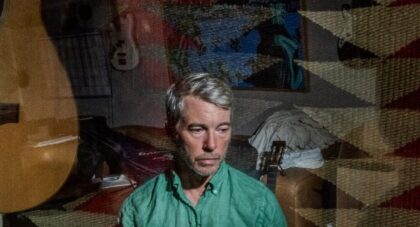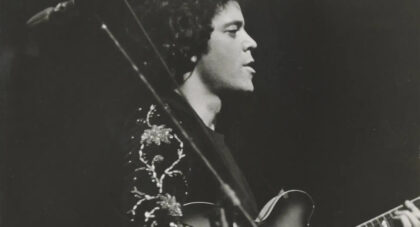I’ll stand on Steve Earle’s coffee table in my Chuck Taylors and say that Simon Joyner is every bit the songwriter Townes Van Zant was. To me and many other appreciators of fine songwriting, Joyner’s status as a songwriter nonpareil is objective and self-evident. Aristotle warned that “when the storytelling in a culture goes bad, the result is decadence,” and I often take comfort in knowing there are a few left like Joyner to help at least postpone what is perhaps inevitable.
Simon’s music moves me. On a recent tour together, I found myself just as affected by his songs on their twentieth performance as on their first. What sets Joyner apart from other songwriters working in the arguably antiquated tradition of earnest, narrative songwriting? Irish novelist Colum McCann said “An ounce of empathy is worth a boatload of judgment,” and Joyner’s embodiment of this ethos is key to understanding his music and why it is special. Though Joyner’s songs can be scathing, even vicious, they never forsake the core humanity of its subjects. In his new song “Nostalgia Blues,” from his remarkable new album Grass, Branch and Bone (Woodsist), Joyner admits to a ne’er do well friend that he won’t be attending her (presumably imminent) funeral, but he has a couch if she ever needs a place to crash. By standing on the shoulders of giants, Joyner has also learned to not repeat their mistakes: absent from Joyner’s music is the self righteous banality, casual nihilism, and inherent male chauvinism that occasionally blemishes the otherwise irreproachable corpora of Neil Young, Lou Reed, and Bob Dylan, respectively.
I was very eager to talk to my friend Simon Joyner about songwriting, clairvoyance, and ping-pong. Our unedited conversation follows. words / j jackson toth
Aquarium Drunkard: Your previous album, Ghosts, was very sonically dense. Grass, Branch and Bone is more minimalist, placing your voice and guitar front and center. Was this deliberate, born of a desire to not repeat yourself, or did the songs you were writing simply dictate the method of recording?
Simon Joyner: A little bit of both, I guess. I did a few living room tours with a minimal, acoustic-based band during the time I was writing the songs, so I became accustomed to hearing them stripped down. But it also seemed like the songs I was writing for this record required a different approach than the songs on Ghosts. Much of what I was dealing with on Ghosts was death and grief and loss in the moment and the disparate emotions and higher tension of those confusing feelings in the characters in those songs. The new record seems to have a lot of memory and reflection, very out-of-the-moment. Many of the events happened in the past and are being re-created in the minds of the characters after some time of processing, which means they are shaping the events, minimizing and softening things, blowing up others, assigning blame and finding meaning instead of merely reacting. It made sense to implement more structure and control in the recording of the record to reflect that theme, I guess.
AD: You were playing a lot of these tunes on tour in advance of recording this new album. I know you spent many years not touring. Having operated both ways, did you find that “road testing” the new songs ultimately affected the way you recorded them for the album this time? How much did they change?
Simon Joyner: I don't think the songs changed too much from touring. I knew that they were going to be presented more like stories and that the music would be complementary but not the focus for this one. With an older album like Skeleton Blues, I played the songs with a full band for a year because there was a lot I wanted to see grow musically out of the songs and by the time we recorded that album, the songs had undergone drastic transformations, which seemed right for that batch of songs. There was a lot less freedom possible for the other players on this record just because of what I was hoping to do. There were many great parts that the players added to the songs during overdubs that I ended up stripping from the songs despite the parts being exciting and inspired. I found that the fuller-sounding the songs got, the more I wanted to cut things so I could hear the song unadorned. I'm sure it was frustrating at times for Ben Brodin who engineered the record and mixed it with me. I knew what I wanted but I sort of had to go through the motions of recording way too much and hearing the songs more dense just to confirm that my instinct was right that the songs should stay relatively bare.
Only the good shit. Aquarium Drunkard is powered by its patrons. Keep the servers humming and help us continue doing it by pledging your support.
To continue reading, become a member or log in.


